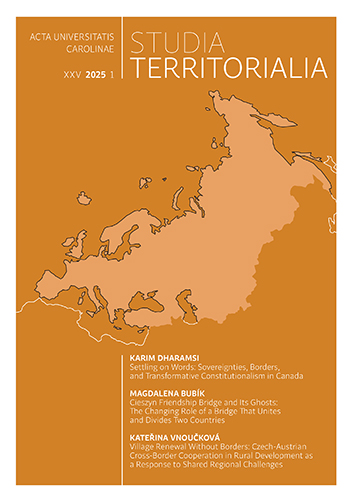AUC Studia Territorialia je recenzovaný akademický časopis z oboru teritoriálních studií. Zaměřuje se na otázky politického, hospodářského, společenského a kulturního vývoje zemí Severní Ameriky, Evropy a postsovětské Eurasie ve 20. a 21. století. Vznikl v roce 2001; v současnosti vychází dvakrát ročně, a to v elektronické a tištěné podobě. Publikuje původní odborné studie, recenze, zprávy o knižních novinkách, konferencích a probíhajícím výzkumu, jakož i jiné kratší odborné texty. Časopis vydává Institut mezinárodních studií FSV UK.
AUC STUDIA TERRITORIALIA, Vol 25 No 1 (2025), 11–46
ArticleSettling on Words: Sovereignties, Borders, and Transformative Constitutionalism in Canada
Karim Dharamsi
DOI: https://doi.org/10.14712/23363231.2025.7
zveřejněno: 09. 11. 2025
Abstract
This article analyzes Canada’s Constitution as a contested “borderland,” a site where competing claims to sovereignty, identity, and moral legitimacy intersect and often clash. While the Charter of Rights and Freedoms promises inclusivity and equality, I argue it remains fundamentally embedded within a settler-colonial order that persistently marginalizes Indigenous peoples. Treaties, when understood as dynamic and relational borders, challenge the Crown’s assertion of absolute authority and underscore the need for constitutional transformation grounded in justice and what Dwayne Donald calls “ethical relationality,” drawn from the Cree concept of wâhkôhtowin. At the same time, immigrant communities access the Charter as a gateway to rights, even as they enter a legal system built upon the dispossession of Indigenous nations – raising moral questions about legal obligation and inclusion. Drawing on Joseph Raz’s “service conception” of authority, this article offers a philosophical audit of Canada’s constitutional legitimacy. Through a structured application of Raz’s three theses – normal justification, dependence, and pre-emptive force – I show how current legal directives frequently fail to align with the moral reasons of Indigenous and minority communities. Engaging with Indigenous legal theorists such as John Borrows and Dwayne Donald, I advocate for transformative constitutionalism, culminating in a renewed constitutional compact rooted in Willie Ermine’s notion of ethical space. Such a framework, I argue, offers the conceptual and normative tools to reimagine sovereignty and legal authority in genuinely pluralistic terms.
klíčová slova: Canada; Indigenous sovereignty; treaties; transformative constitutionalism; legal pluralism; immigrant belonging; settler colonialism; ethical space

Settling on Words: Sovereignties, Borders, and Transformative Constitutionalism in Canada is licensed under a Creative Commons Attribution-NonCommercial-NoDerivatives 4.0 International License.
148 x 210 mm
vychází: 2 x ročně
cena tištěného čísla: 180 Kč
ISSN: 1213-4449
E-ISSN: 2336-3231
